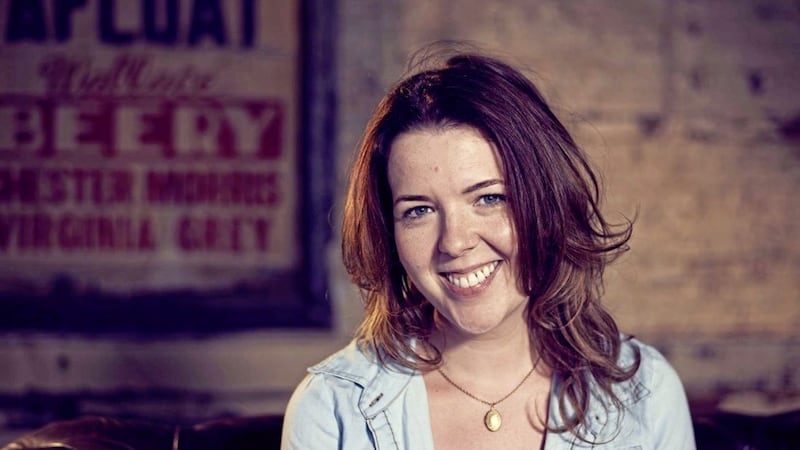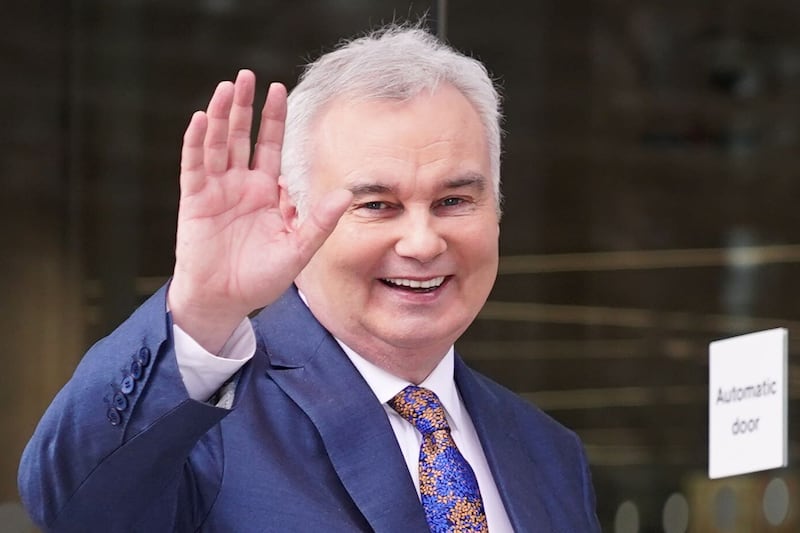Eamonn Holmes, Leo Varadkar and Sonia O'Sullivan are among more than 100 high-profile contributors to a book on Irish identity. Claire Simpson speaks to writer and solicitor Marie-Claire Logue about how a "passion project" created in lockdown came to fruition.
::
“Living away from home people said ‘everyone in Ireland knows everyone’. I said ‘oh that’s not true’. But I had a chat with Lisa McGee, the writer of Derry Girls, and I discovered that my uncle had taught her at school."
Speaking from her home in Derry, Marie-Claire Logue is joking about how she contacted contributors for a new book on what it means to be Irish.
“I was looking for contact details for (Tánaiste) Leo Varadkar," she said.
"I was going through standard emails and my husband said his old neighbour is now an Irish government minister. He said: ‘When I was wee he helped put out a fire in my childhood home.' It was so random how we were naturally finding connections with contributors."
Shortly after the Good Friday Agreement, Ms Logue's father Paddy Logue edited a book, Being Irish, about Irish identity at the turn of the millennium.
Now more than 20 years on, Ms Logue has decided to revisit the project to see how Irish identity has changed.
Being Irish: 101 Views on Irish Identity Today includes contributions from a huge variety of public figures, including Dr Teresa Lambe, co-inventor of the AstraZeneca Covid vaccine, former Sinn Féin president Gerry Adams, ex-Ireland soccer international Kevin Kilbane and ex-champion jockey AP McCoy.
Ms Logue, who works as a solicitor in Derry, grew up in the city and Donegal.
“Change has been sweeping through Ireland and I was curious to find out how fluid or robust Irish identity is," she said.
Ms Logue said the contributors showed "there is no one way to be Irish".
“I sensed a growing confidence in the new Irish in overcoming racism," she said.
"Ireland has changed so much in the last 20 years.
“What came up a lot was the peculiar sense of humour of the Irish and that resilience in the face of adversity. The collection is a tribute to the intelligence and honesty of the contributors."
Belfast-born broadcaster Eamonn Holmes said he felt being Irish "is a privilege".
"I am proud to be thought of as such and being an export myself I am not alone in exporting key elements of what I am and what we are as a people," he said.
"I see being in the public eye as having a duty and obligation to promote the Emerald Isle."
Ms Logue said the book is "not politically focussed", although it does include contributions from SDLP leader Colum Eastwood and Sinn Féin president Mary-Lou McDonald.
“I loved speaking to Lisa McGee," she said.
"We’re both from Derry and I’m a huge fan of Derry Girls. I really loved speaking to Eímear Noone as well. She’s a conductor and composer and was the first woman to conduct at the Oscars. We discovered a shared love of Father Ted.
“It was amazing getting to interview Sonia O’Sullivan and Eileen Flynn, an Irish senator who is a member of the Travelling community.
“The conversations were very warm and relaxed. They were very proud of their identity and keen to talk about it. The contributors also weren’t afraid to challenge their identity.”
Ms Logue was in contact with Tomi Reichental, one of the last Holocaust survivors living in Ireland.
“He has had such a fascinating journey," she said.
"He spent time in a concentration camp, came here in the sixties and has seen such a different Ireland develop in that time."
The book includes contributions from Anglican primate, Archbishop John McDowell, and Mervyn Gibson, Grand Secretary of the Orange Order, who described himself as "British, Northern Irish or Ulsterman depending on the understanding of who is asking".
Ms Logue said contributors talked about how their "identity is so personal".
"What I noticed is emerging is a strong Northern Irish identity - separate to British and Irish," she said.
“A lot of people said they were proud to be Northern Irish and talked about what that meant.”
Ms Logue said many contributors mentioned the 2015 same-sex marriage referendum and the 2018 referendum to repeal the Eighth Amendment to the Constitution and allow abortion in the Republic.
“A lot of them said those two referenda were defining moments in their identity,” she said.
She added: “The past was definitely mentioned. There has been a lot of trauma for us in Ireland but a lot of people were looking more towards the future.”
Ms Logue said her interest in Irish identity was sparked by her time working in Sydney a decade ago.
"A couple of people were chatting about immigration, really complaining about people taking jobs," she said.
"It was really awkward because I was a migrant too. They said ‘oh we don’t mean you’ because I was white. It really made me start to think about identity.”
Ms Logue, a mother to a young son and daughter, wrote the book while she was on maternity leave. Her father Paddy helped baby-sit the children to allow her to work.
"It was such a passion project. I feel so emotionally invested in it and am excited to see people's reactions."
"He (her father) was really enthusiastic about it. He had throat cancer last year so he wasn't as hands on (with the book) as he would have been. But he was doing baby-sitting duties while I was writing it. We are really close and it was lovely to talk to him about it.
"It was really welcome to have something to work on during lockdown. Becoming a parent has made me think about what this book will look like in 20 years’ time.
"What will my children’s journey be? That was a really big motivator for me.”
Published by Liffey Press, Being Irish: 101 views on Irish Identity, is available in all good bookshops and online.








